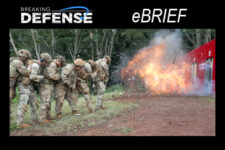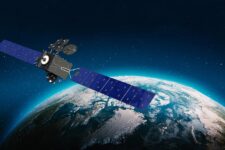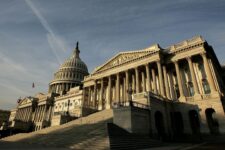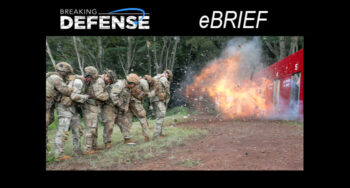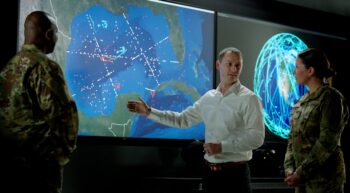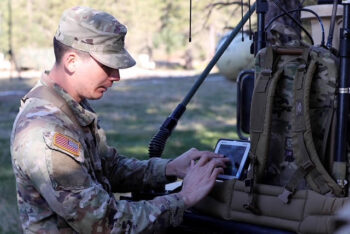 WASHINGTON: DoD is pressing for the FCC to reverse its controversial decision to approve Ligado’s plan to create a mobile 5G communications network, one the Pentagon asserts will jam GPS receivers.
WASHINGTON: DoD is pressing for the FCC to reverse its controversial decision to approve Ligado’s plan to create a mobile 5G communications network, one the Pentagon asserts will jam GPS receivers.
“It is clear to DoD that the risk to GPS far outweighs the benefits of this FCC decision. And the FCC needs to reverse their decision,” DoD CIO Dana Deasy told the Senate Armed Services Committee (SASC) hearing during a marathon hearing this afternoon. A formal “re-petition” action has to be taken by National Telecommunications and Information Administration (NTIA) by the end of May.
NTIA, which falls under the Commerce Department, coordinates federal agency use of the radio frequency spectrum. DoD, Deasy told the SASC, is working to provide NTIA with the necessary technical information to do so.
SASC members were divided on the wisdom of the FCC’s April 20 decision to approve Ligado’s latest plan to repurpose its current L-band spectrum for use in a US-wide terrestrial 5G network. The SASC hearing did not fall along partisan lines. Instead, the division came between the SASC leadership and the committee’s members who also sit on the Senate Commerce, Science and Transportation Committee. It has jurisdiction over the FCC.
For example, while Republican SASC Chairman James Inhofe and Democratic Ranking Member Sen. Jack Reed excoriated the FCC decision, Republican Sen. Roger Wicker, who chairs the Commerce committee, expressed support for the FCC.
Indeed, a number of senators with a foot in the Commerce Committee raised the fact that the FCC’s decision not only was approved unanimously by the five FCC commissioners, but also has been praised by Secretary of State Mike Pompeo and Attorney General William Barr. (Barr was tapped by President Donald Trump on April 4 to head a new Telecom Team designed to ensure that China cannot dominate the 5G marketplace and undercut the security of emerging US networks.)
DoD and many other agencies, including the Transportation Department, have opposed the planned Ligado (formerly LightSquared) network for nearly a decade, arguing that it will drown out GPS signals in most current receivers.
Their protests have been echoed by a wide swathe of the defense and commercial transport industry, including the Aerospace Industries Association and the National Defense Industrial Association. Indeed, according to a press release put out today by Inhofe’s office:
“This opposition extends to the private sector as well. Numerous industries across the gamut – commercial air, satellite communications, weather, construction, and more – have also registered their objections to the FCC’s Order.”
Mike Griffin, head of DoD Research and Engineering, explained that the issue is the “noise” that will be created by Ligado because it will use spectrum designed for satellite use to rebroadcast via terrestrial cell towers. He said that the situation for the vast number of GPS receivers today would be analogous to trying to hear the “rustling of leaves” through the noise of “100 jets taking off all at once.”
Perhaps most significantly, Griffin pushed back hard against Ligado’s assertions in FCC filings (and most recently in a letter today to the SASC obtained by Breaking D) that most receivers would not be affected.
He said testing done by the Transportation Department showed that high-end GPS receivers used in civil aviation, which costs some $10,000 each, are impacted by Ligado’s planned signal strength. Even those “hardened” receivers are “barely capable” of discerning GPS signals through the “noise” caused by Ligado’s 9.8 dBW — an energy level about equal to that put out by a 10 watt light bulb).
More worryingly, Griffin asserted that most commercial GPS receivers — including those that would be used to guide self-driving cars in the future — “lose lock” on the signal at a power level some 100 times lower than Ligado plans to use.
Gen. Jay Raymond, double hatted as the head of Space Force and Space Command, told the SASC that Ligado’s network would have a “significant impact” on Dod’s homeland defense mission, as well as on military and commercial space launch capabilities.
“In my opinion, the impact is significant, and it’s unacceptable,” he said.
While Deasy said one avenue for reversing the decision could be legislative action, it remains unclear what the SASC can actually do, however — should the committee even be able to agree on a course of action.
Inhofe said it is legally unclear to him right now whether the Congressional Review Act, that allows Congress to overturn a decision by a federal agency, actually applies to the FCC decision for technical reasons. (The FCC officially is independent of the Executive Branch.)
Retired Adm. Thad Allen, former Coast Guard Commandant and chair of the Space-Based Positioning and Timing National Advisory Board, suggested that the Senate Commerce Committee should hold a hearing and force the FCC to reconsider. Those members of that committee participating today, including Wicker, seemed reluctant to consider the idea of even having an exploratory hearing.
For example, Democratic Sen. Richard Blumenthal suggested that the matter perhaps might be better adjudicated in the courts, given the questions raised about the legalities of the FCC’s administrative process that have been raised by members of Congress as well as several industry groups.
Autonomy changes everything about combat engineering
Sending robotic vehicles into the breach saves lives by removing humans from one of the most dangerous places on the battlefield.
